A little Problem...
-
@unknownuser said:
@ Jeff
Number's 3 answer is good but explanation seems lack of precision and sybilline for external visitor
What about object number 1,2,3,4,5,6,7,8,9,10,11,12?
Does is it less or more heavy or current?
haha..
i'm definitely not the best at explaining myself.. if i tried to explain using object numbers, it would get a lot more confusing i think
but here goes an example.. let's say the heavier object is #9
place objects 1-6 on one side then objects 7-12 on the other.. 7-12 will weigh more so that eliminates objects 1-6
place 7,8, & 9 on one side then 10, 11, & 12 on the other.. 7-9 will weigh more so that eliminates 10-12..
place 7 on one side and 8 on the other... they weigh the same so that means 9 is the oddball.
[EDIT] and then as Anssi said, in real life, you know you're going to test #9 against some of the other objects so the real world answer is at least 4 if not more

-
@unknownuser said:
You can't say first 9 is heavy!
ha
well i did that for sake of explanation..regardless, i can figure out the answer in about 5 seconds but i could sit here all day long trying to explain how

it's a fault of mine.. -
@ Jeff : yes but...no

You can't say first 9 is heavy!
You must make first all combinaisons and then say for this combinaison 9 is heavy !
So draw first all the tree !Here your proposition

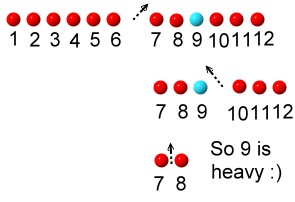
-

If i take you 11 oranges and one false your explanation don't work
Only with a 1/24 hasard
-
really? the way i see it, you can always find the the heavy one in 3 tries.. you mind showing the 1 out of 24 when it wouldn't work?
further, using a different starting technique using 12 objects (5vs5), it's possible to find the oddball in 2 tries.. sometimes (17% chance of doing it 2)
let's say the heavier object is #11..
place 1,2,3,4,5 on one side and 6,7,8,9,10 on the other.. they weigh the same so that eliminates 1-10
place #11 on one side and #12 on the other..
11 weighs more so you've found it in 2 weighings.
-
Annsi, sorry, typo. 2 is the right answer to the original question

Ive got another one for you.

(This problem is an extended case of the above problem.)
The aim is to transfer all the discs from one pole to another without placing a larger disc on a smaller disc at any point.
The rules for moving the discs:
-you can only move 1 at a time,
-a move consists of moving one disc from one pole to another without changing the position of any other discs;
-a disc must always be placed on a larger disc or directly on the base.If i can move the discs at a rate of 10 a minute, how long would it take me to complete a puzzle with 64 discs?
For additional cool points, can you prove your answer? and how does adding a 4th pillar effect the solution?
-
@remus said:
If i can move the discs at a rate of 10 a minute, how long would it take me to complete a puzzle with 64 discs?
wait, you didn't mention what the finished puzzle should be.. do you mean start with the picture and move the stack to a different pole following your guidelines?
[edit1]oh wait.. 3 poles, all 64 discs are off the poles, then build one stack on one pole?
[edit2] ok, i think i got it now
 .. start with a stack of 64 discs on one pole then transfer them to another pole ?
.. start with a stack of 64 discs on one pole then transfer them to another pole ? -
@Jeff
Of course yes, it's just the methodology
In the real world you will be obliged to make all combinaisons first till find a solution and say this is the false object!
Try it in the real world and you will see that i am right
-
@unknownuser said:
wait, you didn't mention what the finished puzzle should be.. do you mean start with the picture and move the stack to a different pole following your guidelines?
Thats it, the aim is to move all the discs to another pole following the rules, so for 2 discs the solution would look like this:
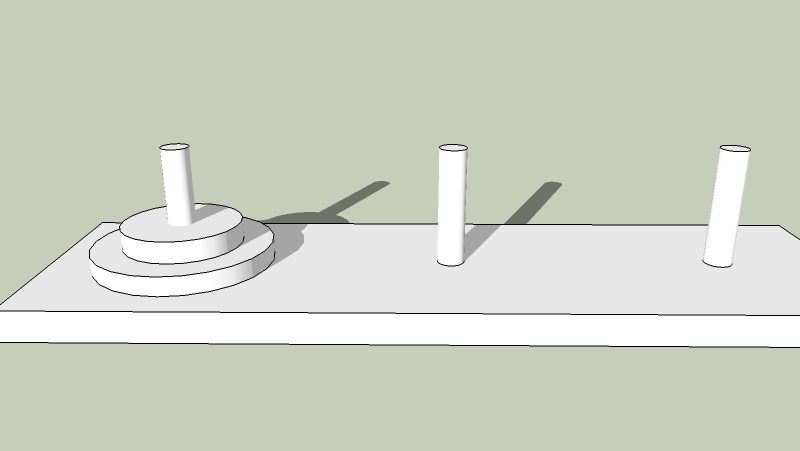
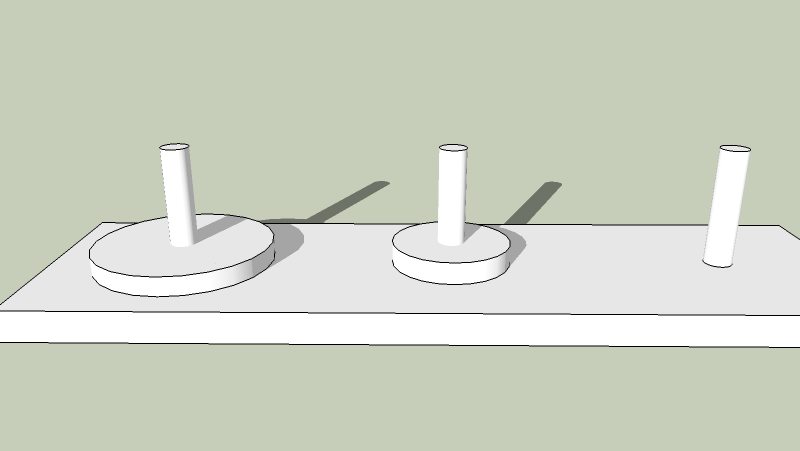
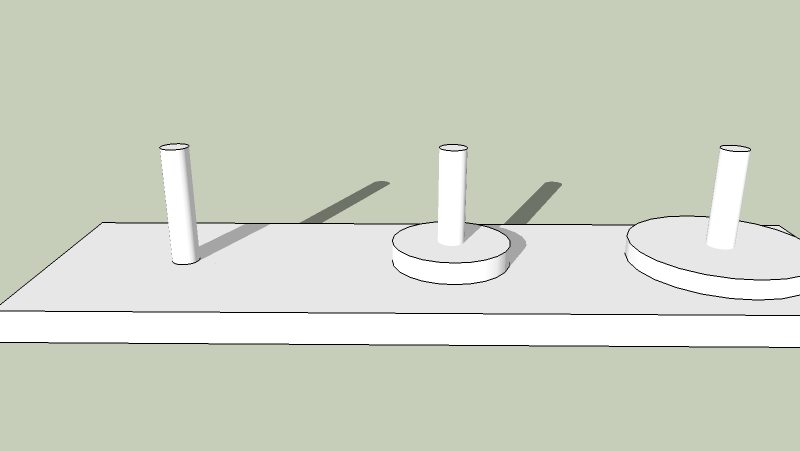
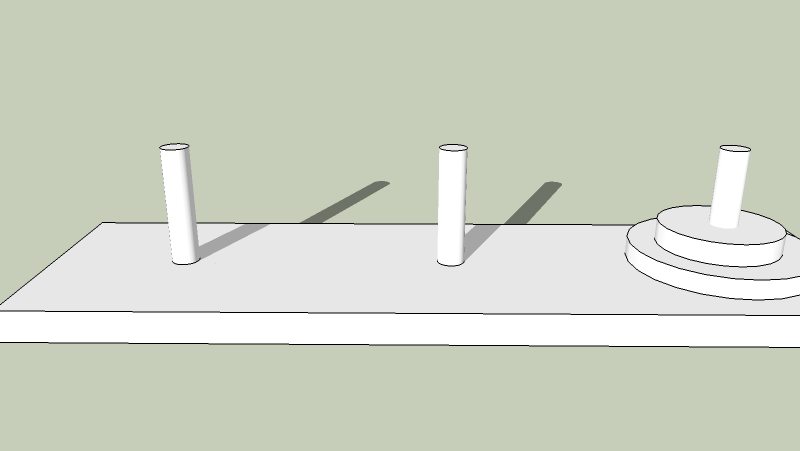
-
-
Updated

-
That is more interresting

You can win 2 millions $ for make a "little" puzzle
But now make speedy answer : 31 12 2009 end first step of the game!

-
can i just answer 'it's going to take forever' ?
that is a huge huge number that i don't really know how to write
i did find a method to obtain the answer though
basically,
2disc = 3 moves
3disc = 7
4disc = 15
5disc = 31
6disc = 63
etc..following that sequence, 7discs = 127 then 8 = 255
i'll try to get it better than that though. -
Good start jeff
 Youve got what we in the business call a recursive solution i.e. you can find n+1 if you know n.
Youve got what we in the business call a recursive solution i.e. you can find n+1 if you know n.The general solution should be fairly easy to find from there.
-
Your a factor of 100 out, you can make 10 moves a minute whereas i guess you took a move takes 10 minutes. Otherwise correct though

-
well, here's the answer i'm going to go with but this stuff is over my head.. i like the practical everyday logic puzzles much better

184,467,440,737,095,516,150 minutes
[edit] hmm.. maybe that's 10 minutes too long? i guess you don't have to wait 10 minutes before making the very first move.
[edit2] oops agian.. i figured it as if you make one move every 10 minutes instead of 10 per minute..
so maybe it's more like
1,844,674,407,370,955,161 minutes...and 30seconds -
@remus said:
Your a factor of 100 out, you can make 10 moves a minute whereas i guess you took a move takes 10 minutes. Otherwise correct though

right.. i update my post as you were posting yours.
ok, i'm gonna go eat ice cream now

-
Very sensible

-
204 minutes
-
howd you get that?
Advertisement







